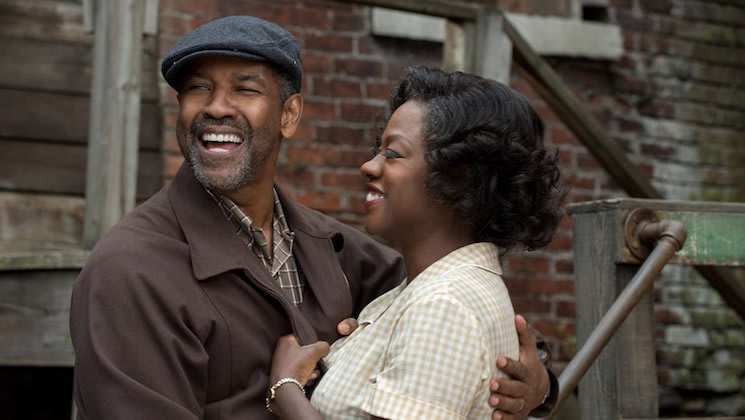Much of this year's Oscar buzz is focusing on Moonlight, a full-scale cinematic adaptation of Tarell Alvin McCraney's play In Moonlight Black Boys Look Blue that transforms his characters, stories and themes into a vivid, cinematic masterpiece, deftly showcasing the nuances of Black masculinity and experience in a specific, hyper-realized context.
Fences, based on August Wilson's 1983 Pulitzer Prize-winning play, seemed poised to join Moonlight in that category. Directed by Denzel Washington, and with a script written by Wilson before his death in 2005, the film follows former Negro League baseball player Troy Maxson, now a patriarch in his 50s, as he struggles to provide for his family and clashes with his son Cory, a promising football player.
But whereas Moonlight used its source material as a launchpad for a full embrace of cinematic tropes and style, Washington adheres to a more rigid adaptation of Fences — but its slow pace, dialogue-driven nature (telling, not showing) and fixed location in and around the Maxson home makes clear that this is no cinematic reimagining: it's a play on screen, unfolding with little modification from its original form.
But despite — or, perhaps, due to — its stylistic stubbornness, Fences delivers intimate, high-calibre performances courtesy of its stars. Director Washington also stars as Troy Maxson, and his portrayal of a man still bitter about leaving his dreams of sports stardom behind displays a character filled with complexities, one whose actions are understandable without necessarily garnering sympathy.
For all Washington's attention as both director and star, the film's heart and soul is Viola Davis and Troy's wife, Rose. If Troy is the depiction of a man broken by the system — carrying the weight of his inability to break baseball's race barrier in favour of less talented but younger players — Rose is a woman whose obstacles are domestic, more personal, and her performance serves to single-handedly justify Fences' "play on screen" portrayal, with Davis giving a rich, up-close performance to an audience of millions, instead of however many the house could fit one night. Her Oscar nomination for Best Supporting Actress seems inevitable.
But Davis' performance isn't enough to make the film equally great. Its languid pacing and expositional dialogue hints at the world within Fences, but even its explosive, human performances aren't enough to keep the film engaging throughout its two-hour-plus runtime. There are many astonishing moments here, but parsing them is oftentimes more exhausting than it needs to be.
(Paramount Pictures)Fences, based on August Wilson's 1983 Pulitzer Prize-winning play, seemed poised to join Moonlight in that category. Directed by Denzel Washington, and with a script written by Wilson before his death in 2005, the film follows former Negro League baseball player Troy Maxson, now a patriarch in his 50s, as he struggles to provide for his family and clashes with his son Cory, a promising football player.
But whereas Moonlight used its source material as a launchpad for a full embrace of cinematic tropes and style, Washington adheres to a more rigid adaptation of Fences — but its slow pace, dialogue-driven nature (telling, not showing) and fixed location in and around the Maxson home makes clear that this is no cinematic reimagining: it's a play on screen, unfolding with little modification from its original form.
But despite — or, perhaps, due to — its stylistic stubbornness, Fences delivers intimate, high-calibre performances courtesy of its stars. Director Washington also stars as Troy Maxson, and his portrayal of a man still bitter about leaving his dreams of sports stardom behind displays a character filled with complexities, one whose actions are understandable without necessarily garnering sympathy.
For all Washington's attention as both director and star, the film's heart and soul is Viola Davis and Troy's wife, Rose. If Troy is the depiction of a man broken by the system — carrying the weight of his inability to break baseball's race barrier in favour of less talented but younger players — Rose is a woman whose obstacles are domestic, more personal, and her performance serves to single-handedly justify Fences' "play on screen" portrayal, with Davis giving a rich, up-close performance to an audience of millions, instead of however many the house could fit one night. Her Oscar nomination for Best Supporting Actress seems inevitable.
But Davis' performance isn't enough to make the film equally great. Its languid pacing and expositional dialogue hints at the world within Fences, but even its explosive, human performances aren't enough to keep the film engaging throughout its two-hour-plus runtime. There are many astonishing moments here, but parsing them is oftentimes more exhausting than it needs to be.
